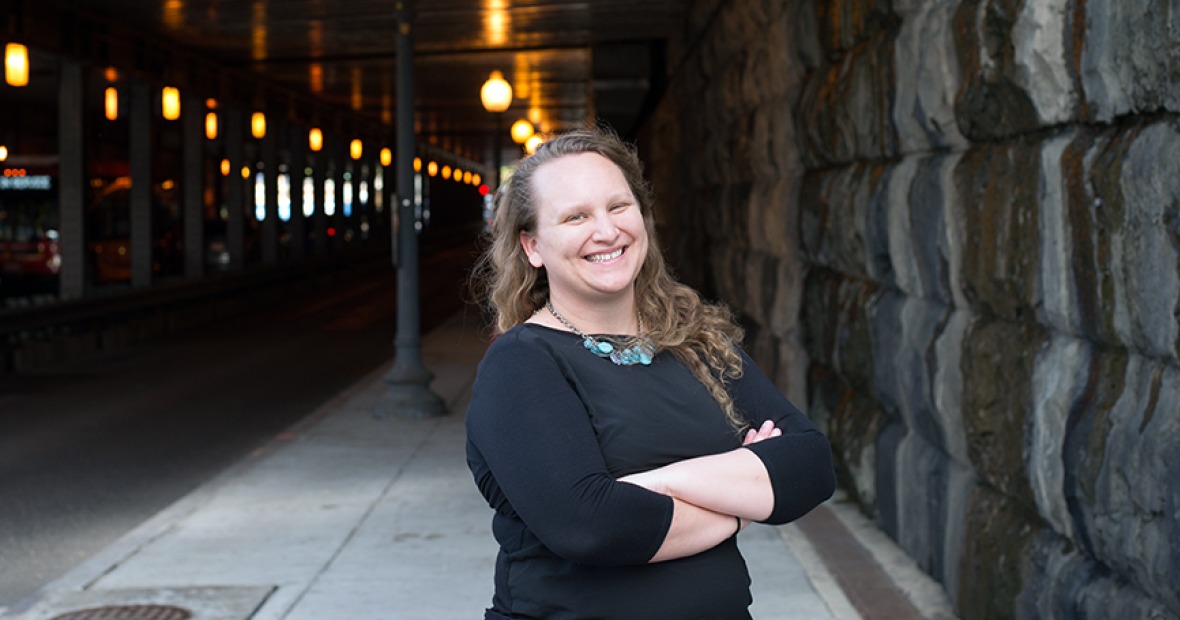Street-Based Sex Work
Real stories from sex workers bolster alumna’s research
Tequia Burt ’98
A biology and religious studies double-major at Grinnell College, Katie Hail-Jares ’07 looks back on Professor Tammy Nyden’s Philosophy of Science class as instrumental to the way she approaches her research on sex work. It was in that class that she realized that in order to grow, science needed to include more diverse voices.
Hail-Jares’ certainty that storytelling is essential to understanding research was the driving force behind Challenging Perspectives on Street-Based Sex Work (Temple University Press, 2017), which Hail-Jares co-edited. The book unites academics with the people whose lives are affected by street-based sex work (SBSW) to discuss policy and new directions for research.
“Our book takes academic chapters about SBSW and intersperses them with response chapters written by people whose lives are impacted by sex work, including sex workers themselves, police officers, public defenders, activists, and medical providers,” she says.
The book grew out of her experience working with Washington, D.C.,-based HIPS, a harm reduction program that provides safer sex and injection supplies to street-based sex workers. She found that sex workers often felt taken advantage of by researchers because most of their work focused on a limited number of negative narratives. They often voiced frustration to Hail-Jares that the programming and policies that came out of it weren’t really helpful and didn’t address structural barriers like housing, unemployment, or transphobia.
“Street-based sex workers have agency and are not pimp-controlled, drug-addicted caricatures,” she explains. “Many of the chapters authored by sex workers in the book discuss how they took on incredible advocacy opportunities to improve their communities. There are thoughtful discussions about pregnancy, gentrification, and the constitutionality of anti-prostitution statutes.”
Hail-Jares, currently a postdoctoral fellow at Griffith Criminology Institute in Queensland, Australia, says the unconventional approach of blending the activist, Everywoman perspective with those in the “ivory tower” was met with skepticism in academia. Some presses even urged her to not give authorship to nonacademic authors.
“We had a few presses that originally were interested in the manuscript that then passed when we refused to change the format and authorship to make those chapters more traditional,” Hail-Jares says.
After the book was published, it resonated so much with the community that it inspired an original play, Project Dawn, which has been performed in Philadelphia, Atlanta and Kansas City, Mo., in the past year.
The play explores the experiences of women in Project Dawn, a prostitution diversion court that really exists in Philadelphia. Two of the book’s chapters are firsthand experiences written by Project Dawn staff members. Hail-Jares’ co-editor, Corey Shdaimah, and the playwright Karen Hartman worked together closely to incorporate research and the voices featured in the book into the script.
“It is very unusual for academic research to influence the creative arts in this way," Hail-Jares says. "We were excited about this opportunity to collaborate and reach a different audience.”
Hail-Jares’ work with underserved populations is not new. While an undergraduate, she received a national Harry S. Truman Scholarship for her work in coordinating the Grinnell College’s Liberal Arts in Prison Program. After graduation, she co-founded the Iowa Coalition Against Domestic Violence’s Skylark Project to provide legal and social services and support to incarcerated survivors of sexual assault and domestic violence.
This book has given her the opportunity to merge her past work with her current research. “I am so overjoyed that most sex workers have responded positively to the book and are supportive,” she says. “I keep every one of those messages.”

